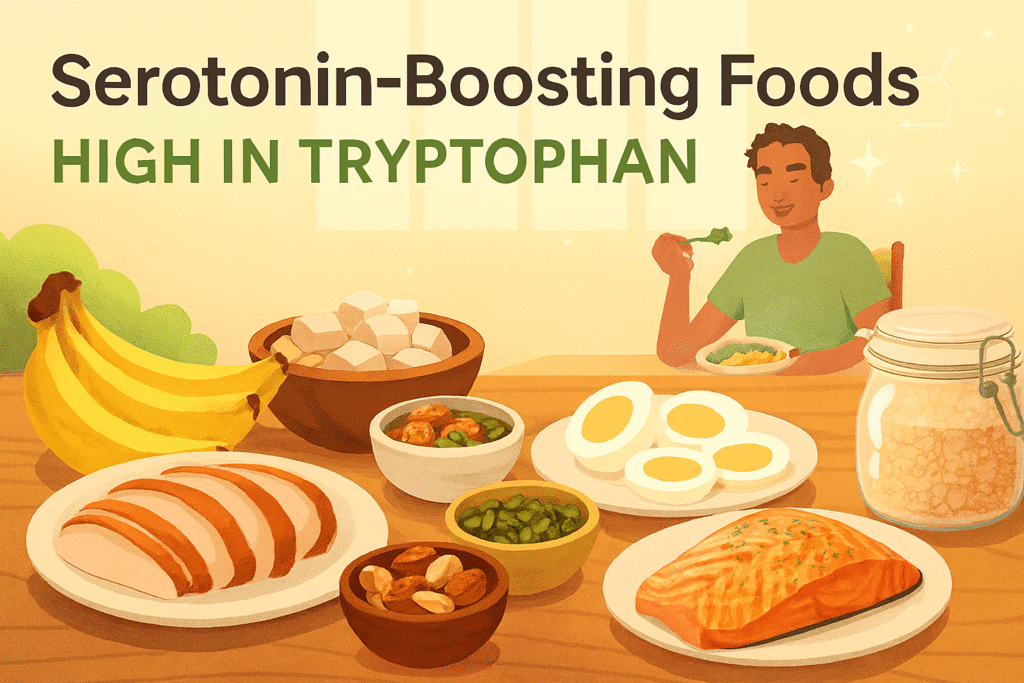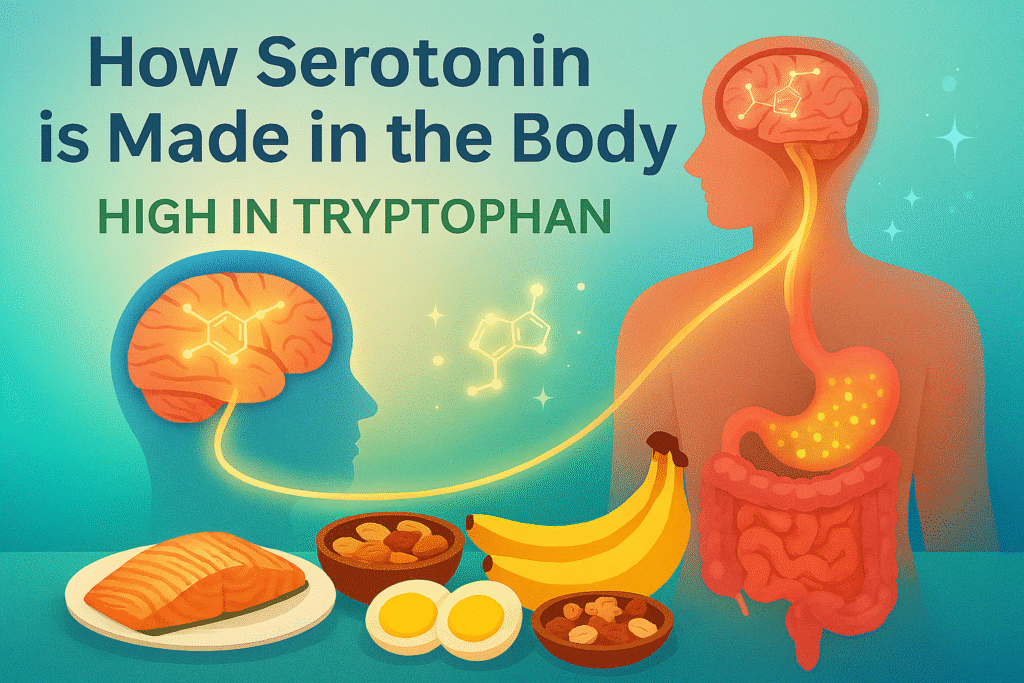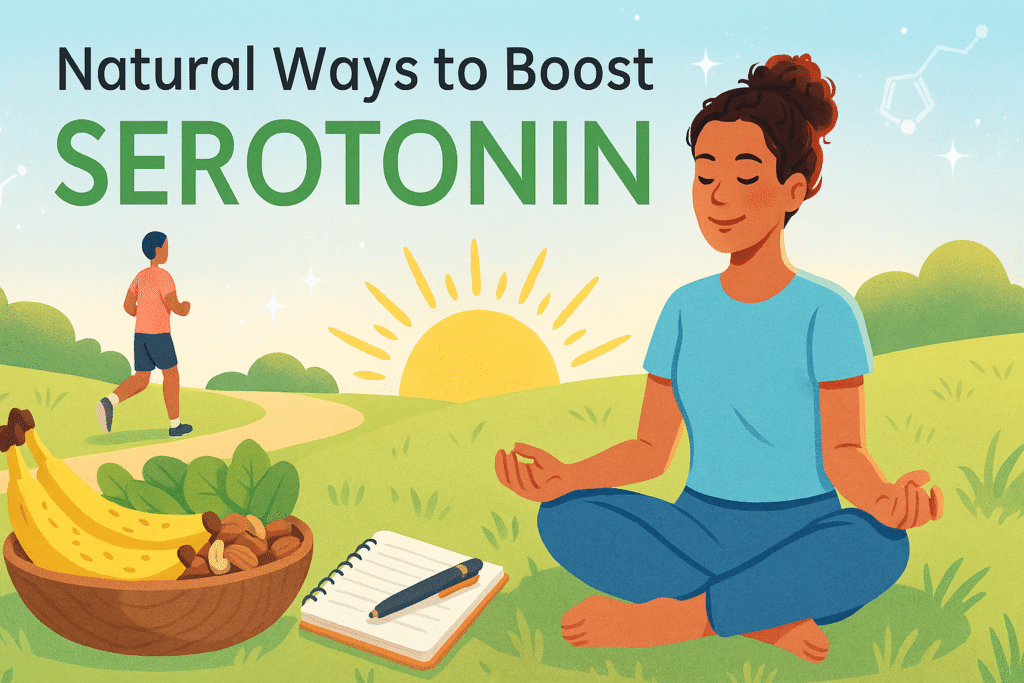Serotonin is called the “feel-good” chemical. It helps control mood, sleep, and digestion. It also keeps us healthy. Most serotonin—about 90%—is made in the gut. This shows how the gut and the brain are linked.
Natural Ways to Boost Serotonin Levels
1. Eat Foods High in Tryptophan
Quick Tip: Add turkey, eggs, salmon, tofu, and nuts to your meals.
Tryptophan is an amino acid your body uses to make serotonin. Eating these foods with complex carbs helps move tryptophan to the brain. This boosts serotonin naturally.
Examples:
- Turkey and chicken
- Salmon and other fatty fish
- Eggs and dairy
- Tofu and soy
- Nuts and seeds
- Oats and bananas

2. Exercise Regularly
Quick Tip: Do at least 30 minutes of walking, running, or cycling most days.
Exercise increases tryptophan in the brain. This helps make more serotonin and improves mood.
3. Get Natural Sunlight
Quick Tip: Spend 10–15 minutes outside every morning.
Sunlight helps your brain make serotonin. Morning sunlight also improves sleep by regulating your body clock.
4. Eat Fermented Foods
Quick Tip: Include kimchi, sauerkraut, kefir, or yogurt in your diet.
Fermented foods have probiotics. These support your gut, which makes serotonin. A healthy gut helps your brain and mood.
5. Practice Mindfulness
Quick Tip: Try meditation, deep breathing, or yoga daily.
Stress can lower serotonin. Mindfulness reduces cortisol, the stress hormone, and helps your body keep serotonin balanced.
How Serotonin is Made

Serotonin starts from tryptophan, an amino acid. Vitamins, minerals, and other amino acids also affect how your body makes it.
The Gut-Brain Connection
The gut and brain talk to each other through the gut-brain axis. Healthy gut bacteria make serotonin and help your brain work well.
The Role of the Vagus Nerve
The vagus nerve sends messages between the gut and brain. These messages can trigger serotonin release and improve mood.
Summary of Natural Serotonin Boosters
| Method | Benefits | Examples |
|---|---|---|
| Tryptophan-Rich Foods | Supports serotonin synthesis | Turkey, salmon, tofu |
| Regular Exercise | Increases tryptophan availability | Walking, running, cycling |
| Sunlight Exposure | Stimulates serotonin production | Morning walks, outdoor activities |
| Fermented Foods | Enhances gut microbiota and serotonin | Kimchi, sauerkraut, kefir |
| Mindfulness Practices | Reduces stress and supports serotonin | Meditation, yoga, deep breathing |
Frequently Asked Questions
Q1: How long does it take to notice improvements in mood after increasing serotonin levels naturally?
A: It can vary, but many individuals report feeling better within a few weeks of consistently implementing lifestyle changes such as dietary adjustments, regular exercise, and stress management techniques.
Q2: Can supplements help boost serotonin levels?
A: While certain supplements like tryptophan, 5-HTP, and probiotics may support serotonin production, it’s essential to consult with a healthcare provider before starting any supplement regimen.
Q3: Are there any risks associated with boosting serotonin levels naturally?
A: Generally, natural methods like dietary changes and exercise are safe. However, it’s important to approach any new regimen cautiously and consult with a healthcare professional, especially if you have underlying health conditions.
Q4: Can a lack of sleep affect serotonin levels?
A: Yes, inadequate sleep can disrupt serotonin production and receptor sensitivity, leading to mood disturbances and other health issues.
Q5: Is there a connection between serotonin and depression?
A: Yes, low serotonin levels have been linked to mood disorders like depression. Enhancing serotonin production through natural methods can be a supportive strategy in managing these conditions.
Author Bio
Dr. Farid Ahmmad is a nutrition and mental health specialist with 10+ years of experience in gut-brain wellness. He focuses on practical, science-backed ways to boost mood, support gut health, and improve overall well-being.
References


